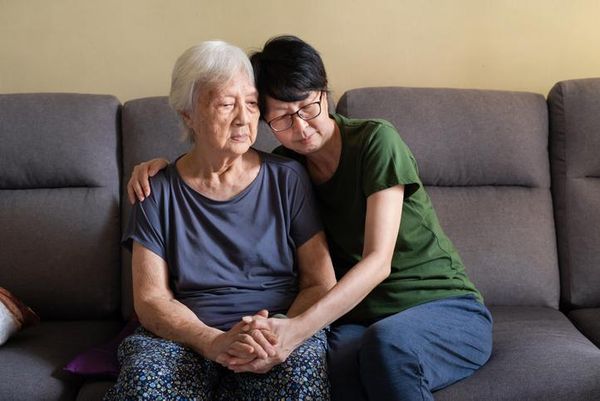If you're both raising a child and caring for an aging parent, you might feel as if you're stuck between a rock and a hard place—otherwise known as the sandwich generation. One out of eight Americans between the ages of 40 to 60 is playing a juggling act between the younger and older generations. And that number is expected to rise as baby boomers edge toward retirement age and life expectancy of the elderly climbs.
This is not a new phenomenon, but perhaps it is one that is creating extra stress because it is coinciding with kids either getting ready to enter or come out of college, unstable employment and adult children (and their parents) facing tougher economic times. Add to that the fact that families are smaller than they once were, so there might be fewer siblings with which to share the burden. And with more women in the workforce than in previous generations, having the extra responsibility of yet another person or persons to care for squeezes their time even more.
Caregiver burnout is rampant. It's stressful enough caring for another person, but when you're in the sandwich generation, squeezed between simultaneous demands of your own children and your parent or parents, it's even tougher. Even if you don't live with your parent, you may be needed for personal care, household or financial assistance and/or errands for your parent.
It's happening to me—and all around me. Where conversations used to be all about exciting things like college admissions and empty nests, now they frequently are dominated by another topic: aging parents. Recently at a dinner party with a bunch of other boomers, our conversations quickly turned to our parents.
One woman, herself an only child, waxed poetic about how excited she was to be at the party, totally burned out from being the sole caretaker for her 85-year-old mother (who has been living with her for 10 years), on top of caring for her own children, 10- and 12-year-old boys. Another complained that her parents were becoming more and more infirm and demanding. She was in the process of researching assisted living facilities, all new territory for her. She was justifiably concerned over their cleanliness and reliability of care.
Is everyone in this situation walking around stressed, anxious, depressed and frightened? Many are.
That's why I reached out to Dr. Kathy Johnson, CMC, Certified Geriatric Care Manager, Founder and Chief Executive Officer of Home Care Assistance, North America's leading provider of in-home senior care. Dr. Johnson has also coauthored a book, The Best Kept Secrets to a Long and Happy Life, based on the groundbreaking Okinawa Centenarian Study. The book offers information on what it takes to delay or escape Alzheimer's and other chronic diseases, as well as how to slow the aging process.
Q. Many children feel emotionally or financially obligated to care for their parents inside their own home, rather than send them to an outside facility. How can an adult child best accommodate their home and schedule to the needs of aging parents?
A. Before an aging parent appears on your doorstep, have a frank, realistic discussion with your spouse and family. Regardless of how much free time you have, you cannot do this alone. It is highly likely that your parent will eventually need help with basic daily tasks including meals, shopping, cleaning, laundry and medical appointments—probably more than any one person can handle.
Caring for a dependent parent is an emotionally-charged issue. It is psychologically hard for most adult children to see their formerly vibrant parents suffer from chronic disease or watch as parents decline. So right from the start, you should be sure to involve others in your parents' care. Don't be afraid to seek out help from friends, family and the community.
Set ground rules before your parent moves in. Discuss everything—from who will pay for the extra costs of food and do all the related chores to help you will need to guard your privacy. Then share these rules with all involved parties.
There are a few simple things you can do that will keep your parents safe once they are in your home. For example, installing bathroom grab bars is a necessity. A grab-bar can prevent accidents that might occur in a wet environment. These bars will also reduce the strain on your parents' hips and knees. Also, consider purchasing a PERS (personal emergency response system) device, so your parents are safe even when you are out of the house.
Q. Women of the sandwich generation are more likely to be married, according to a government report. This is likely to create tension within their marriage and even within their relationship with their own children. What can families do to deal with this possibility?
A. Communication is key. Call a family meeting and discuss needs and expectations. Make sure everyone in the family has a chance to share their feelings. Tasks should be assigned to every member in the household.
Be realistic about what you can do. Don't expect too much of yourself, either emotionally, physically or financially.
Ask for help. Contact family members, friends or community resources like your local Office on Aging or senior center. Some hospitals or churches might also offer classes in caregiving for elderly parents with certain physical conditions or limitations.
Make time for yourself. Even if it's just a 10-minute walk around the block or a quick soak in the tub before bed, don't lose touch with yourself.
Laughter is the best medicine. Keep a sense of humor about the situation, and always try to look on the bright side of things.
Q. Can you say something about advance planning? For example, long-term care insurance: is this something that will help with a lot of the emotional and financial strain of caring for elderly parents? What is the best way to look into this type of insurance?
A. The cost of long-term care is the top challenge facing seniors and their families. Average costs for a nursing-home stay, an assisted-living facility or home care services can easily reach $100,000 a year or more. Sadly, government benefits do not cover many of the costs associated with aging. So, yes, long-term care insurance is a wonderful thing to have for your parents and for yourself. Most long-term care insurance pays for home care, assisted living and nursing care. For many people it is a lifesaver.
It is best to have a frank discussion with your parents about their financial situation. Find out what insurance policies are in force and if they have long-term care insurance. There is also a veterans benefit that helps with the cost of care for war vets. Ask your parents if they have any savings that they can use to cover the costs of care. You can find out more by visiting the National Clearinghouse for Long-Term Care at https://acl.gov/ltc.
Q. Because of the demands of caring for others, many women are liable to forgo their own health, both mentally and physically. What are some warning signs of caregiver burnout?
A. Caregiver stress is real and often leads to serious health problems. The number one step caregivers can take to protect their own health is to closely monitor their stress levels. This is important because your level of personal stress can have an impact on your health; high stress levels have been shown to lower resistance to disease, lead to fatigue and depression. According to Psychology Today, warning signs of burnout include:
- Feeling overwhelmed
- Sleeping too much or too little
- Gaining or losing a lot of weight
- Feeling tired much of the time
- Losing interest in activities you used to enjoy
- Becoming easily irritated or angered
- Feeling constantly worried or sad
- Having frequent headaches, bodily pain or other physical problems
- Abusing alcohol or drugs (including prescription drugs)
Q. What strategies can you recommend for family caregivers to keep their stress levels in check and avoid burnout?
A. Here are some tips:
- Attend a support group.
- Vary the focus of caregiving responsibilities if possible (rotate responsibilities with family members).
- Exercise daily and maintain a healthy diet.
- Establish quiet time for meditation.
- Hire a caregiver from a reputable home care agency to provide respite care.







